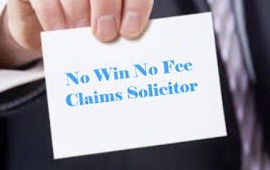A no-win-no-fee costs agreement means that a lawyer does not charge the client for legal fees unless the client has a successful outcome.
People who are weary of the high costs of pursuing legal matters generally welcome this fee arrangement.
This article examines how much compensation you can get when you make a no-win no, fee claim. It’s important to note that the compensation received will be less than any legal fees and disbursements.
Uplift Fee
Legal fees can be higher than those charged in the usual costs agreement between the lawyer and client. This is the case because the lawyer bears the risk that the matter might be unsuccessful, and as a result, they will have to forgo legal costs.
In a no-win no-fee agreement, law firms may charge an ‘uplift fee’. The uplift fee only applies if the matter is successful and is generally a percentage of the fees.
The uplift fee may not exceed 25% of the other expenses and must also be mentioned separately in the costs agreement.
The lawyer has to provide the client with an estimate of the possible uplift fee. They should also tell you what is considered when determining the uplift fee.
The 50/50 Rule
There is a legal obligation on your lawyer to follow what is commonly known as the ‘50/50’ rule if the following is applicable:
- You and your lawyer have a no win no, fee arrangement in place; and
- You have a personal injury claim.
The 50/50 rule limits how much that law firm can claim from you in personal injury matters. The 50/50 rule aims to prevent personal injury claimants from being financially worse off after pursuing their case.
The 50/50 rule establishes a maximum limit on legal fees (including GST).
The most that a law firm can claim from you (including GST) is 50% of the settlement amount after refunds (e.g. to Medicare or Centrelink) and disbursements have been subtracted.
The 50/50 Rule Formula
The formula is the following:
Maximum fees = settlement– (refunds + disbursements) ÷ 2
Note the following:
- The formula applies to personal injury claims for damages, and some matters may be considered personal injury cases but are not regarded as such under the legislation.
This can include:
- Claims against insurers for life or disability insurance policies:
- Government benefit claims, for instance, a disability pension, workers’ compensation benefits claims, and criminal compensation claims
The courts have not decided if these claims follow the 50/50 rule.
- The formula does not account for interest on loans (e.g. litigation or a personal loan) made regarding the claim. This interest will be paid from the client’s portion of the settlement or judgment.
Discuss any fees or clauses with your lawyer if you are uncertain.
Conclusion
A no win no fee claim amounts to your settlement or judgement amount less all legal fees and costs, which should not exceed 50%. Before entering into any fee agreement, ensure you are aware of all expenses charged and whether an uplift fee is applicable.
Contact Smith’s Lawyers for more information regarding no-win, no-fee claims. They offer Queensland’s first risk-free compensation claim: No Win, No Fee, No Catch®. If your matter goes to court and you lose, all costs are covered – so you won’t have to pay them or anybody else.




